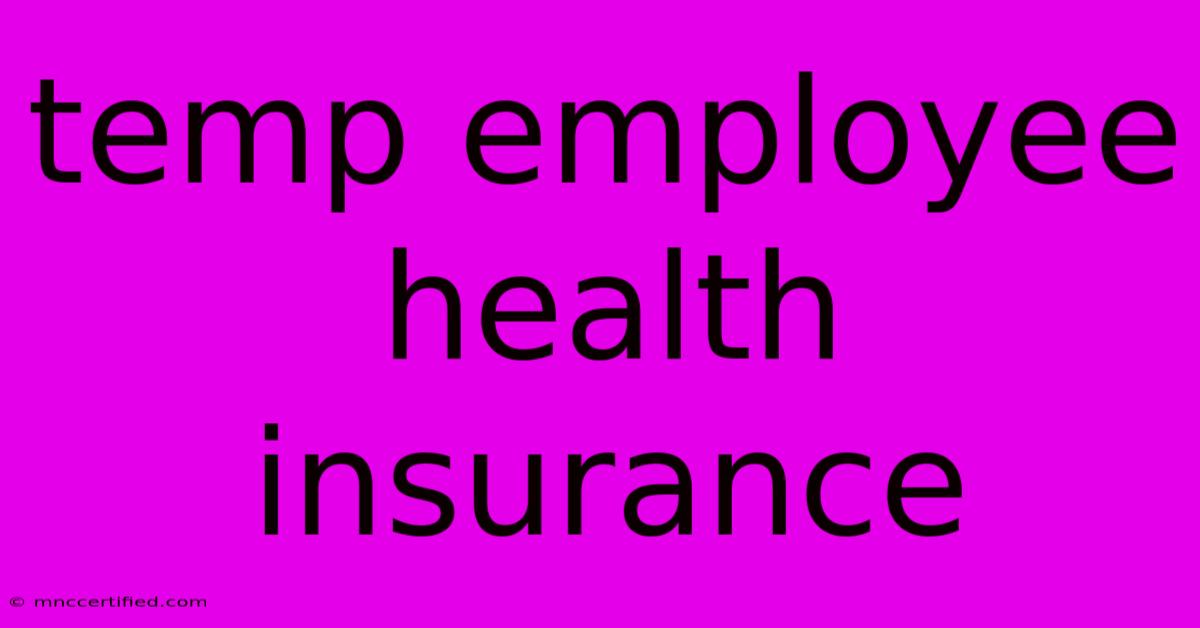Temp Employee Health Insurance

Table of Contents
Navigating the Maze: A Complete Guide to Temp Employee Health Insurance
Finding affordable and reliable health insurance can be a challenge for anyone, but it's especially tricky for temporary employees. Unlike permanent workers, temps often don't receive employer-sponsored health benefits. This guide will unravel the complexities of temp employee health insurance, outlining your options and helping you make informed decisions.
Understanding the Challenges Faced by Temp Workers
Temporary employees, often working through staffing agencies or on short-term contracts, face unique hurdles when it comes to healthcare coverage. The lack of employer-sponsored plans leaves them responsible for securing their own insurance, potentially leading to:
- Cost Concerns: Individual health insurance plans can be significantly more expensive than employer-sponsored plans, creating a considerable financial burden.
- Coverage Gaps: The intermittent nature of temp work can result in periods without health insurance, leaving individuals vulnerable to unexpected medical expenses.
- Navigational Difficulties: The sheer number of plans and providers can be overwhelming, making it difficult to choose the right coverage.
Exploring Your Health Insurance Options as a Temp Employee
Fortunately, several options exist to help temporary workers secure affordable and comprehensive health coverage. Let's explore them:
1. The Affordable Care Act (ACA) Marketplace
The ACA Marketplace (also known as Healthcare.gov) offers a range of health insurance plans from different providers. This is often the most viable option for temp workers as it:
- Provides subsidies: Based on income, you may qualify for financial assistance to lower your monthly premiums.
- Offers diverse plan types: From Bronze (low premiums, high out-of-pocket costs) to Platinum (high premiums, low out-of-pocket costs), you can find a plan that suits your budget and needs.
- Guarantees coverage: The ACA protects individuals with pre-existing conditions, ensuring access to healthcare regardless of health status.
Key Considerations: Open enrollment periods exist, so plan accordingly. You'll need to carefully compare plans and choose the one that best balances cost and coverage.
2. Short-Term Health Insurance Plans
Short-term health insurance plans offer temporary coverage, often lasting a few months. While cheaper than ACA plans, they typically:
- Have limited coverage: They may exclude pre-existing conditions and essential health benefits.
- Are not a long-term solution: They are intended for temporary needs, not as a replacement for comprehensive health insurance.
Key Considerations: Assess your specific needs carefully. Short-term plans might be suitable for bridging gaps between jobs, but not for long-term healthcare needs.
3. COBRA Continuation Coverage
If you recently lost employer-sponsored health insurance, COBRA allows you to continue your coverage for a limited time. However, it's often:
- Very expensive: You'll pay the full premium, including the employer's portion, making it a costly option.
- Not always feasible: It only applies if you meet specific eligibility criteria, and the cost may be prohibitive.
Key Considerations: Evaluate the cost versus the benefit. COBRA might be a temporary solution, but explore other options if the cost is too high.
4. Medicaid and CHIP
Depending on your income and state, you might qualify for Medicaid (for low-income adults and families) or CHIP (for children). These programs offer:
- Affordable or free coverage: Eligibility varies by state, but these programs provide subsidized or free healthcare.
- Comprehensive benefits: They typically cover a wide range of medical services.
Key Considerations: Check your state's eligibility requirements. Medicaid and CHIP are crucial resources for low-income individuals and families.
Tips for Temp Workers Securing Health Insurance
- Plan ahead: Don't wait until you need healthcare to secure coverage. Research your options proactively.
- Compare plans carefully: Don't just focus on premiums; consider deductibles, co-pays, and out-of-pocket maximums.
- Understand your needs: Consider your health history, potential health risks, and anticipated healthcare usage.
- Seek professional advice: Consult with an insurance broker or healthcare navigator for personalized guidance.
Conclusion: Taking Control of Your Temp Employee Health Insurance
Navigating the world of temp employee health insurance requires careful planning and research. By understanding your options, comparing plans, and seeking professional advice, you can secure the healthcare coverage you need and deserve. Remember, your health is your most valuable asset – prioritize it accordingly.

Thank you for visiting our website wich cover about Temp Employee Health Insurance. We hope the information provided has been useful to you. Feel free to contact us if you have any questions or need further assistance. See you next time and dont miss to bookmark.
Featured Posts
-
Haulers Insurance Phone Number
Nov 27, 2024
-
Conversational Ai In Insurance
Nov 27, 2024
-
Sr 22 Insurance South Carolina
Nov 27, 2024
-
Lainey Wilsons Spin Song Country Girl
Nov 27, 2024
-
Farm Bureau Insurance Cheyenne
Nov 27, 2024